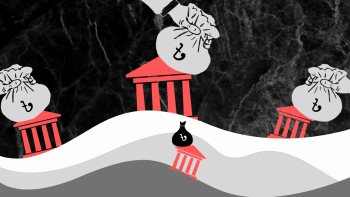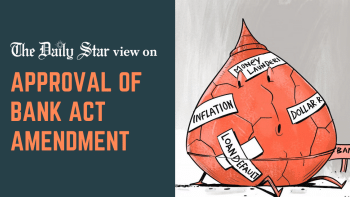Overflow of non-performing loans

Not unsurprisingly, Bangladesh's banking sector now has the second-highest ratio of non-performing loans (NPLs) in all of South Asia, as lenders continue to face numerous challenges emanating from scams, a lack of corporate governance, and reluctance by borrowers to make regular instalment payments. It is not an achievement to be proud of by any means. The only country that has a higher ratio of NPLs in South Asia is Sri Lanka, which has been enmeshed in a severe economic crisis.
A World Bank report titled "Expanding Opportunities: Toward Inclusive Growth", which exposed this disturbing fact, also revealed that Bangladesh has the highest ratio of NPLs among non-bank financial institutions (NBFIs) in the whole of South Asia. In most South Asian countries, NPL ratios remained below the 2021 levels and the 10 percent threshold commonly used to indicate systemic stress in countries of the region. The only exceptions were Bangladesh, where the NPL ratio reached above the 2021 level and reached dangerously close to the 10 percent threshold – logging in at 9.4 percent – and Sri Lanka.
As of December 2022, defaulted loans at banks in Bangladesh had increased 16.8 percent year-on-year to Tk 1,20,656 crore. According to central bank data, the ratio accounted for 8.16 percent of the outstanding loans given out by banks as of December, up from 7.93 percent a year ago. The increase came despite the Bangladesh Bank further relaxing the rules on rescheduling to bring down the rate of default loans last July. What this clearly shows – for the umpteenth time – is that relaxing rules can't tame defaulted loans, as experts have said repeatedly.
In February, the International Monetary Fund (IMF) identified the problems in the banking sector, including the high volume of NPLs, as one of the three major domestic risks that may derail the economy in the short- to medium-term, and said that the likelihood of it spilling over to the wider economy ranges from medium to high. This is also something economists have been saying for a long time.
The one saving grace for the banking sector and the larger economy could be the adoption of the draft Bank Company (Amendment) Act, 2023, which could potentially usher in major consequences for habitual loan defaulters and restrict the influence of families on a bank's board. However, what is strange in that regard is that the government is yet to publish the draft of the Act, which it was expected to do after the cabinet approved it on March 28. Since it is not a secret document, the government should publish it to receive feedback and recommendations from stakeholders. It should also begin to enforce strict banking rules for habitual defaulters, and ensure that no more scams occur right under the noses of our regulators.

 For all latest news, follow The Daily Star's Google News channel.
For all latest news, follow The Daily Star's Google News channel. 










Comments